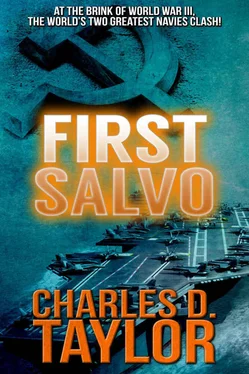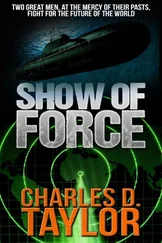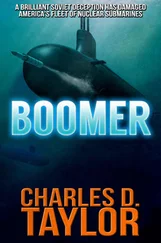Charles D. Taylor
First Salvo
This book is dedicated most affectionately to my sons, Jack and Ben

Charles Taylor is the bestselling author of thirteen naval action/adventure novels, primarily featuring the nuclear submarine service and the U.S. Navy SEALS. After serving as a Naval Reserve destroyer officer in the Atlantic and Caribbean, he followed a career in both educational and literary publishing. He currently divides his time between summers in Wyoming and winters on the Caribbean island of St. Croix.
It is sometimes easier to undertake the actual writing of a book than to gather the necessary support. I’m luckier than most, for I have constantly had the support of a wonderful family and valued friends. Captain William M. McDonald has, over the years, progressed from my commanding officer to good friend and a valuable source of information. Bob Donovan has the greatest patience for answering technical questions for a nontechnical writer. Dan Mundy would never let me get away with the slightest oversight and I value his criticism immensely. Bill Story enjoyed reversing positions and assuming the role of critic. Mel Parker’s assistance meant a great deal to the finished manuscript. I would be lost without the other talented assistance that comes with each book I write — Candy Bergquist’s typing and Laurie Meehan’s mapwork. And my wife, Georgie, is the best and toughest critic.
The United States Naval Institute in Annapolis is the finest source of naval literature in this country. I often rely on the accuracy of the monthly issue of their Proceedings , a professional journal without peer, and I made use of the following titles from the Naval Institute Press: Keepers of the Sea by Fred J. Maroon and Edward L. Beach (1983), Guide to the Soviet Navy by Norman Polmar (third ed., 1983), The Ships and Aircraft of the U.S. Fleet by Norman Polmar (twelfth ed., 1981), and Combat Fleets of the World, 1980/81 edited by Jean Labayle Couhat and translated by A. D. Baker III (1980). Other books were Soviet Military Power by the U.S. Government Printing Office (1984), How to Make War by James F. Dunnigan (Morrow 1982), The Third World War: The Untold Story by General Sir John Hackett (Macmillan 1982), War in Space by James Canan (Harper and Row 1982), The New High Ground by Thomas Karas (Simon and Schuster 1983), and two titles by Christopher Dobson and Ronald Payne, The Terrorists: Their Weapons, Leaders and Tactics and Counterattack: The West’s Battle Against the Terrorists (Facts on File 1982).
“We must decide whether we intend to remain the strongest nation in the world. The alternative is to let ourselves slip into inferiority, into a position of weakness in a harsh world where principles unsupported by power are victimized, and to become a nation with more of a past than a future. I reject that alternative.”
— U.S. Secretary of Defense Harold Brown, January, 1980
“The battle for the first salvo is taking a special meaning in naval battle under present-day conditions.… Delay in the employment of weapons in a naval battle or operation inevitably will be fraught with the most serious and even fatal consequences, regardless of where the fleet is located, at sea or in port.”
— Admiral Sergei Gorshkov, Admiral of the Fleet of the Soviet Union
The power structure in Washington had been privy to the Soviet Union’s intentions well before D minus 7. In a world made smaller by satellite reconnaissance and instant communications, no nation could conceal such tactics for long.
It had been predicted by the CIA that, about one week preliminary to a concerted ground attack against NATO forces in Central Europe, the Soviet Union would initiate a series of military-political feints in various parts of the globe. The intent would be to confuse intelligence networks as to their exact goal. It could involve an increase in terrorist activities, an instigation of localized civil wars, previously unannounced military games in critical areas, and probable overt acts against U.S. forces — all of which would be followed immediately by release of misinformation via KGB stations in major cities.
SIX MILES OFF THE RHODE ISLAND COAST
The Joseph and Mary wallowed in the heavy swells, her barnacled hull heaving from one side to the other, displaying a coating of green algae. Gaspar Porcino, her captain, was exhausted. His thin, hawk-like face, heavily tanned by months of summer fishing, bristled with two days’ growth of beard, and the dark circles under his eyes revealed a man who lived by the sea. But his catch was poor that trip; the hold was only half full. Nothing had gone right.
An hour before departure, Porcino was forced to call his oldest son to join them when two of the crew showed up drunk. Once at sea, constant engine trouble restricted fishing time, and part of their equipment was lost in a squall the first night.
The catch had been off for weeks, and the engine was still acting up. At noon, he ordered the crew to haul in. There was no sense in challenging bad luck any further.
He headed the Joseph and Mary ’s bow west northwest. His course would keep Block Island to port and put enough distance between them and the little pleasure boats. Then he would head west through Block Island Sound and finally due north after Fishers Island into New London and home. Captain Porcino could see Sandy Point on Block Island to port and even make out Point Judith, Rhode Island, on the horizon to starboard through the muggy, end-of-August haze. There was no need for radar, but out of habit he snapped it on just the same. The screen painted a large object off his starboard bow about four miles distant. Raising his binoculars, he could make out the familiar lines of the ferry following its standard course from Point Judith to Block Island. As usual, it would be full of families on vacation, their station wagons parked bumper to bumper on the main deck and jammed with luggage and pets. Once the trawl was in, he would increase speed and pass her astern.
“Captain… Captain….” An anxious voice interrupted his reverie. Manuel Modica was waving his arms frantically, giving the sign to stop the engine. As he cut engine, Porcino could hear the man shouting in his Portuguese accent, “The net… she eese foul wit someting….”
Porcino jumped down the few steps from his pilothouse to the main deck and hurried aft. His men were alternately winching and peering over the side to search for whatever had become trapped in the gear.
“Very beeg,” Modica reported, stretching his arms wide before the captain. “Heavy… perhaps too beeg to bring in.”
“You handle the winch, Manuel,” Porcino ordered. “You just watch me and I’ll tell you when to haul and when to stop. We can’t take a chance on losing anything more this trip.” He shrugged to himself. “And so close to home.” He leaned over the stern to peer into the murky water. There was nothing visible.
The captain, never looking behind him, held his right arm in the air, closing his fist to indicate that Modica should engage the winch. Whatever was fouled, Porcino could feel its bulk through the hull under his feet. The boards throbbed as the winch engine strained. The stern sank slightly with the weight.
Читать дальше













